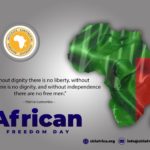
KEYNOTE SPEECH BY CONTINENTAL LEADERSHIP RESEARCH INSTITUTE EXECUTIVE DIRECTOR MR. MUNDIA PAUL HAKOOLA
The Minister of Information, The acting Deputy Chief of Mission, U.S. Embassy Zambia, the Executive Director Media Institute of Southern Africa, distinguished guests, ladies and gentlemen, on behalf of the Continental Leadership Research Institute; I’m delighted to welcome you to this launch of the capacity building workshop for journalists training in media reporting on human rights. And thank you for your great support and enthusiasm for the training.
The project will promote and protect the human rights of youths and women in rural communities through community sensitization programs in 8 districts create rural support group meetings and also create a platform for human rights issues to be discussed at rural community level through community radio programs. We take this opportunity to thank the US Embassy for this support as it goes a long way to shape our democracy, the US has being a strong partner of democracy across the world.
Today, we send a resounding message that media freedom is not only a national but also a universal value. Free media protects both society from human rights abuse and helps citizens release their full potential.
The institution has noticed there are challenges that call for definitive actions to protect human rights violations and the media plays a pivotal role in combating these violations. The most affected are women and children who have become vulnerable to abuse, neglect, exploitation and poverty due to lack of adequate access to economic rights.
It is Imperative that our society today takes extreme necessity to take decisive action by giving importance to journalists as a crucial component of the protection of human rights violations. This calls for media to be vigilant and also intensify efforts to investigate violation of rights and offer offenders to be prosecuted regardless of the offender.
The media needs to improve efforts for a comprehensive approach in handling cases of abuse, exploitation and discrimination through a strengthened partnership and clarification roles and seamless coordination among agencies.
The institute today urges the Minister of Information and media to ensure that the Access to Information Bill is enacted because it gives the public a general right of access to official documents and make provisions for incidental and connected purposes. The bill is critical because it enables citizens’ exercise their voice to effectively monitor and hold government to account and enter into informed dialogue about decisions that affect their lives.
The bill also aims to address challenges affecting media freedom of expression, the institute advocates for media freedom if they are work around issues of human rights abuses and bring culprits to book.
In closing, the maturity of a society is measured by how well human rights violation issues are addressed. Looking at the number of abusive and discriminatory cases that go unpunished and unreported – sexual, physical, economic or otherwise, it is plain to see that we have a long way to go in creating an environment fit for all.
We, therefore, extend our hand to partner with you the Ministry of Information and media, Media Institute for southern Africa and all Media houses and together, let us work for a habitable environment safe from human rights abuses.
I thank you!



Follow Us On